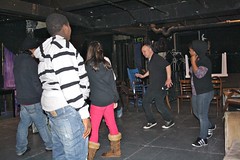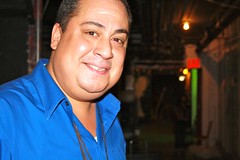The Theater for the New City is asking the city to help fund an expansion of its Arts-in-Education after-school program even as fewer public dollars go to such initiatives. Last week, a Community Board 3 committee voiced its support for the bid; tomorrow, the theater will ask the full board for its backing.
At a meeting last Tuesday, Primy Rivera, the program’s coordinator, and Keith Ninesling, the theater’s developmental director, asked C.B. 3’s Youth and Education committee to write a general letter of support that can be attached to any applications for funding.
Mr. Ninesling spoke of the reputation the program has developed since its launch in the late 1990s. “We feel this is an essential community outreach service,” he said, adding that the not-for-profit theater is one of a dwindling number of community theaters in the city. “Not only does it serve the purpose of training young, would-be artists (we need somebody who can carry the torch),” said Mr. Ninesling, “but more important is serving the children in the East Village and Lower East Side.”
Twice a year, during nine-week sessions, professional actors and performers teach 25 “at-risk” students to make masks, stilt walk, juggle and more. During a visit to the after-school program, Mr. Rivera told The Local it was a “safe haven” for kids, who often come to him with issues they are having at home or in school.
Justin Rodriguez, 19, is just one success story. Eleven years ago, his grandmother dragged him to the theater after she spotted a poster at his school. Mr. Rodriguez, who lives in the Jacob Riis Houses, said he had been getting in trouble with a local gang over a race issue. He soon discovered he had a passion for acting; after completing the program, he went on to participate in the theater’s popular summer street theater. He now works as an assistant teacher.
“It is important because we are giving back to the community,” said Mr. Rodriguez, “and we are saving a generation of kids who could really be somebody.”
The program – which is paid for through the theater’s general budget, private donations, and funds from the New York City Department of Cultural Affairs and the New York State Council of the Arts – receives 60 to 70 applications for each session, but can only accommodate 25 participants at its current size. Theater management is seeking to raise an additional $20,000 each year, so that it may double the amount of students on its roster.
“Being a partial-year program, it is difficult to get city funding,” said David Crane, a member of Community Board 3, after a first draft of the letter was circulated. The theater has so far been ineligible to receive earmarked city dollars partly because the program only runs in spring and summer.
Board member Gigi Lee said that the program’s strong commitment to the arts might be another reason it has had trouble finding consistent funding from the city. “There has been a move toward more academic-focused after-school [programs],” she said, adding that the past few years had seen a marked decrease in city funding for after school programs in general.
Cathleen Collins, deputy chief of staff for the New York City Department of Youth and Community Development Commissioner, said in an interview that new guidelines for the Out-of-School Time program for Elementary and Middle School Youth, which funds after-school activities, do place a stricter emphasis on the academic components of programs that apply for funding.
The city initiative’s budget for the current fiscal year is $92.8 million – twice what it was when it launched in 2005, but a 23 percent decrease from peak funds in 2008-2009. Neighborhoods with high numbers of children living in poverty and receiving state-subsidized care are considered target zip codes for funding and are prioritized in the application process. Of the 21 after-school programs receiving city dollars in C.B. 3’s district, 14 are within target zip code 10002, and only six are within East Village zip codes 10009 and 10003. Another is in 10022.
Following Tuesday’s roundtable, a motion to grant the theater a letter of support passed unanimously. The letter will be redrafted and a vote will be put on the agenda for November’s full board meeting tomorrow at P.S. 124, at 40 Division Street.





